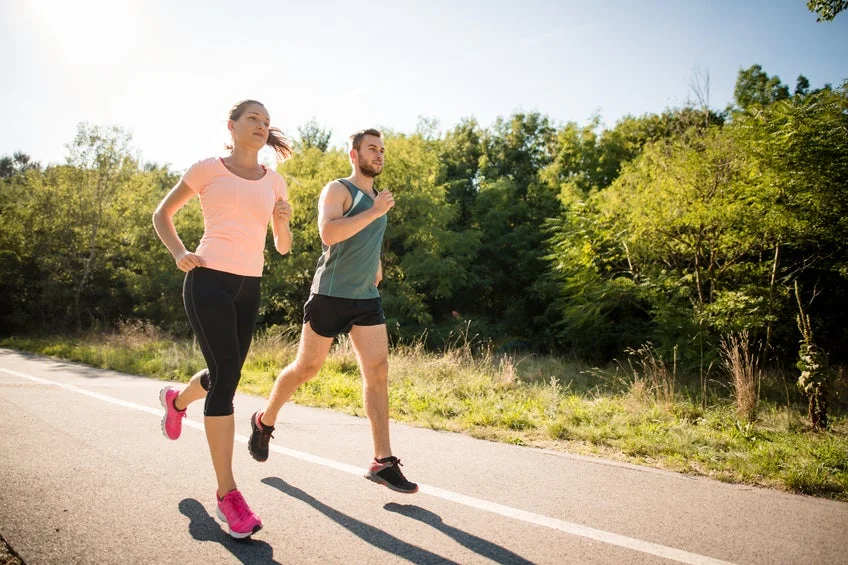Michelle Harrison had a great fall 2019. Harrison, 45, is an avid runner and recalls feeling “invincible” after she had completed another half-marathon.
All that changed was around Thanksgiving when she began experiencing stomach pains and other digestive symptoms. She found herself running to the toilet three to five times per day. In three weeks her health began to decline and she was now going to the toilet more than 30 times per day.
Harrison describes, “I couldn’t eat and didn’t have any energy.” “I thought I would die,” Harrison said.
Harrison sought medical attention in December that year and was quickly diagnosed with ulcerative colitis (UC), a type of inflammatory bowel disorder (IBD). She says, “The doctor said that my entire colon was inflamed and that my case was very serious.”
Harrison began her treatment plan, which included biologic infusions every 4 weeks and a daily maintenance drug. She soon got back on the trail, and in summer 2020 she completed the 100-mile Nike Trail Challenge. This is a two-month-long challenge.
She says, “There were times when I had to stop my workout because I had to go to the toilet after only 0.1 miles.” Harrison finished the challenge in 8 weeks, ahead of schedule.
Other runners with UC can struggle, just like Harrison. She is proof that it is possible to overcome it. Here’s how.
1. First, Get Your Colitis Under Control
Noah St. John ACSM, a registered dietitian and certified exercise physiologist at Duke Health and Fitness Center in Durham, North Carolina, says, “If you’re recently diagnosed with ulcerative colitis I would recommend that you put the running on hold and the UC on top burner.” St. John suggests that you take the time to identify your food triggers, create a medication plan with your doctor, and keep track of your food intake before beginning or returning to running.
2. Keep hydrated
People with UC who have had their colon removed are more at risk of dehydration. Amy Barto MD, a gastroenterologist at Duke University School of Medicine Irritable Bowel Disease Clinic in Durham, North Carolina, said that people with UC who have had their colon removed are more at risk. Patients with UC who exercise need to be hydrated.
Michael Steck, a long-time runner and ACE-certified coach, advises runners to be careful with what they eat before running. He says that hydration is a major problem, especially if you have diarrhea.
Steck suggests that you avoid sugary sports drinks for shorter runs. Sugar pulls water into the small and large intestines, which can cause GI problems. Steck suggests electrolyte-infused water, which are free of added sugars and hydrate the body.
He says that sports drinks like Gatorade are good for long runs. They replenish electrolytes and provide simple sugars to your body, which can be used for energy.
3. A few hours before a run, fuel up
Steck says, “If you are going to eat a complete meal consisting of the three macros — carbohydrates, lean protein and healthy fat — then do it no sooner than two hours prior to your run. And three hours is even better.”
This is because there’s an increase of blood flow to your digestive system after a meal. Steck says that during a run, the blood flows to your legs and away from your digestive tract. You may feel cramping, nausea and diarrhea when this happens.
He says, “It is best to get that full-meal in a few days before [a run] so your body has ample time to digest it with minimal interference.”
Dr. Barto suggests high-protein foods like Greek yogurt which is low in lactose.
Five Complications of Ulcerative Collitis
Ulcerative Colitis, also known as IBD or Autoimmune Disease, is a type of IBD. UC can cause complications that affect more than the digestive tract. These are the things you need to be aware of.
4. Minimize Caffeine and Fiber
Barto says that nobody wants to experience a flare up during a run.
Steck adds, “A lot of it comes down to listening and understanding your body.” When it comes to making decisions about what to do, the body is my best resource of information. Each patient must know what trigger foods are most bothersome to them.
5. Purchase an Ostomy bag for runners
St. John says that ostomy bags are available in many different options today, particularly for runners. He suggests that you choose one with a belt and a water bottle so you can have small sips of water throughout your run.
He also mentions that there are bags specifically designed to not chafe in your runs. St. John says that some people use tape to cover their bags so the plastic edges don’t rub.
Running shorts and athletic pants with high waists are good options to keep your ostomy bag in place.
6. Look for an alternative
Harrison was unable to run during a flare but she was able do other forms such as walking, biking and hiking.
She says, “I was able to push myself with distance and elevation, and didn’t care about speed.”
Since her diagnosis, Harrison has not been able complete a marathon in one go. She says that her longest single-run run was just over nine miles. She has managed to hike over 26 miles.
7. Take Care of Your Pain Meds
Barto says that if you sustain an injury while running, you should not take nonsteroidal anti-inflammatory pain medication (such as ibuprofen) because they can trigger an IBD flare. Instead, take acetaminophen, and use therapies like stretching, heat and massage.
8. Make sure you are prepared
There is nothing worse than feeling irritable during a run, especially if you aren’t near a restroom. Harrison suggests keeping some wet wipes and other supplies in your running belt. St. John says, “If you have an Ostomy bag, make sure to have the supplies to clean it out during a run.”







